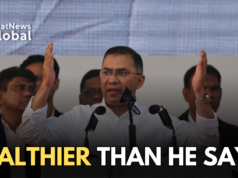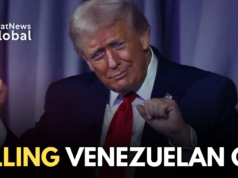Trump Immunity Ruling
The U.S. Supreme Court is expected to announce its decision on Donald Trump’s immunity from prosecution this week. Trump is involved in this case due to his role in the January 6 attack on the U.S. Capitol. Some legal scholars predict much of the Department of Justice’s case against him will remain intact. According to Constitutional Law Fellow Mathew Seligman from Stanford Law School, “The Supreme Court won’t grant immunity to a President for any actions during office. Former President Trump hasn’t even requested this.” June 28 is the potential release date for the ruling.
In April, the case included about 2-1/2 hours of arguments, during which most Justices seemed unlikely to support Trump’s claim of “absolute immunity” for presidential acts. Trump’s assertion faltered under questioning about hypothetical crimes, including by conservative Justice Amy Coney Barrett.
U.S. Supreme Court Bench
Conservative Justices hold a 6-3 majority on the Supreme Court and have expressed concerns about presidential immunity, particularly for less severe acts. However, the specifics of their ruling remain uncertain following arguments on presidential powers.
Legal Opinion
Richard Painter a Law Professor at the University of Minnesota and a Former Chief White House Ethics Lawyer had this to say. “The President of the United States does not have an official duty to declare himself the winner of an election and, to say, well, gee, because I’m president, I could prevent election fraud. And election fraud occurs whenever I lose. And therefore, even though Joe Biden got 8 million votes more than I did, you know, I can start claiming election fraud in my official capacity and committing all these alleged crimes. Now the government has to prove these crimes. But I doubt very much, that the court’s going to rule against Jack Smith on these specific criminal charges.”
‘Trumped Up’ Charges
Seeking to regain the White House this year, Trump appealed after lower courts denied his request for immunity. He wants immunity from four election-related criminal charges. He argued that his actions leading to indictment by Special Counsel Jack Smith occurred while he served as President.
(With Reuters Inputs)
The 'Eye' of the story not the 'I' of the story. That's Amitabh Pashupati Revi's credo from the beginning of his professional journey in 1995. From conflicts in the war zones of Afghanistan, Syria, and Iraq to nuances of international politics in the Maldives,Thailand, and South Sudan, Amitabh has reported from all the world's continents, except for Antarctica(so far). Though, he has documented the world's third pole, the Siachen Glacier!
Amitabh reports and produces documentaries on the two-front China-Pakistan threat to India. His ground reports from Arunachal Pradesh and Ladakh have received viewership in the hundreds of thousands. Amitabh has interviewed world leaders, top global analysts, and experts in India, Russia, the United States, and Australia as well. Along the way, he’s picked up the Russian language, the Ramnath Goenka Award for his reporting on the 'Islamic State' terrorist group in Iraq, the Khaled Alkhateb Award for his reporting from Palmyra, Syria, and the UN Dag Hammarskjöld Distinguished Journalist Fellowship. Last but not least, as a founder member of StratNews Global, Amitabh helps lead the reporting, editorial, production, and administration teams at StratNews Global, BharatShakti, and InterStellar on their journey ahead.




